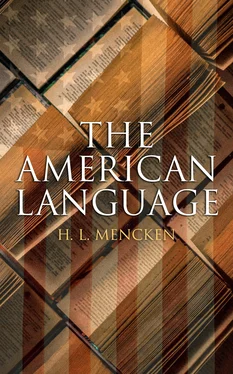H. L. Mencken
An Inquiry into the Development of English in the United States
e-artnow, 2021
Contact: info@e-artnow.org
EAN: 4064066498788
Preface
I. By Way of Introduction
1. The Diverging Streams
2. The Academic Attitude
3. The View of Writing Men
4. Foreign Observers
5. The Characters of American
6. The Materials of American
II. The Beginnings of American
1. In Colonial Days
2. Sources of Early Americanisms
3. New Words of English Material
4. Changed Meanings
5. Archaic English Words
6. Colonial Pronunciation
III. The Period of Growth
1. The New Nation
2. The Language in the Making
3. The Expanding Vocabulary
4. Loan-Words
5. Pronunciation
IV. American and English Today
1. The Two Vocabularies
2. Differences in Usage
3. Honorifics
4. Euphemisms and Forbidden Words
V. Tendencies in American
1. International Exchanges
2. Points of Difference
3. Lost Distinctions
4. Foreign Influences Today
5. Processes of Word Formation
6. Pronunciation
VI. The Common Speech
1. Grammarians and Their Ways
2. Spoken American As It Is
3. The Verb
4. The Pronoun
5. The Adverb
6. The Noun and Adjective
7. The Double Negative
8. Pronunciation
VII. Differences in Spelling
1. Typical Forms
2. General Tendencies
3. The Influence of Webster
4. Exchanges
5. Simplified Spelling
6. Minor Differences
VIII. Proper Names in America
1. Surnames
2. Given Names
3. Geographical Names
4. Street Names
IX. Miscellanea
1. Proverb and Platitude
2. American Slang
3. The Future of the Language
List of Words and Phrases
Table of Contents
The aim of this book is best exhibited by describing its origin. I am, and have been since early manhood, an editor of newspapers, magazines and books, and a critic of the last named. These occupations have forced me into a pretty wide familiarity with current literature, both periodical and within covers, and in particular into a familiarity with the current literature of England and America. It was part of my daily work, for a good many years, to read the principal English newspapers and reviews; it has been part of my work, all the time, to read the more important English novels, essays, poetry and criticism. An American born and bred, I early noted, as everyone else in like case must note, certain salient differences between the English of England and the English of America as practically spoken and written—differences in vocabulary, in syntax, in the shades and habits of idiom, and even, coming to the common speech, in grammar. And I noted too, of course, partly during visits to England but more largely by a somewhat wide and intimate intercourse with English people in the United States, the obvious differences between English and American pronunciation and intonation.
Greatly interested in these differences—some of them so great that they led me to seek exchanges of light with Englishmen—I looked for some work that would describe and account for them with a show of completeness, and perhaps depict the process of their origin. I soon found that no such work existed, either in England or in America—that the whole literature of the subject was astonishingly meagre and unsatisfactory. There were several dictionaries of Americanisms, true enough, but only one of them made any pretension to scientific method, and even that one was woefully narrow and incomplete. The one more general treatise, the work of a man foreign to both England and America in race and education, was more than 40 years old, and full of palpable errors. For the rest, there was only a fugitive and inconsequential literature—an almost useless mass of notes and essays, chiefly by the minor sort of pedagogues, seldom illuminating, save in small details, and often incredibly ignorant and inaccurate. On the large and important subject of American pronunciation, for example, I could find nothing save a few casual essays. On American spelling, with its wide and constantly visible divergences from English usages, there was little more. On American grammar there was nothing whatever. Worse, an important part of the poor literature that I unearthed was devoted to absurd efforts to prove that no such thing as an American variety of English existed—that the differences I constantly encountered in English and that my English friends encountered in American were chiefly imaginary, and to be explained away by denying them.
Still intrigued by the subject, and in despair of getting any illumination from such theoretical masters of it, I began a collection of materials for my own information, and gradually it took on a rather formidable bulk. My interest in it being made known by various articles in the newspapers and magazines, I began also to receive contributions from other persons of the same fancy, both English and American, and gradually my collection fell into a certain order, and I saw the workings of general laws in what, at first, had appeared to be mere chaos. The present book then began to take form—its preparation a sort of recreation from other and far different labor. It is anything but an exhaustive treatise upon the subject; it is not even an exhaustive examination of the materials. All it pretends to do is to articulate some of those materials—to get some approach to order and coherence into them, and so pave the way for a better work by some more competent man. That work calls for the equipment of a first-rate philologist, which I am surely not. All I have done here is to stake out the field, sometimes borrowing suggestions from other inquirers and sometimes, as in the case of American grammar, attempting to run the lines myself.
That it should be regarded as an anti-social act to examine and exhibit the constantly growing differences between English and American, as certain American pedants argue sharply—this doctrine is quite beyond my understanding. All it indicates, stripped of sophistry, is a somewhat childish effort to gain the approval of Englishmen—a belated efflorescence of the colonial spirit, often commingled with fashionable aspiration. The plain fact is that the English themselves are not deceived, nor do they grant the approval so ardently sought for. On the contrary, they are keenly aware of the differences between the two dialects, and often discuss them, as the following pages show. Perhaps one dialect, in the long run, will defeat and absorb the other; if the two nations continue to be partners in great adventures it may very well happen. But even in that case, something may be accomplished by examining the differences which exist today. In some ways, as in intonation, English usage is plainly better than American. In others, as in spelling, American usage is as plainly better than English. But in order to develop usages that the people of both nations will accept it is obviously necessary to study the differences now visible. This study thus shows a certain utility. But its chief excuse is its human interest, for it prods deeply into national idiosyncrasies and ways of mind, and that sort of prodding is always entertaining.
I am thus neither teacher, nor prophet, nor reformer, but merely inquirer. The exigencies of my vocation make me almost completely bilingual; I can write English, as in this clause, quite as readily as American, as in this here one. Moreover, I have a hand for a compromise dialect which embodies the common materials of both, and is thus free from offense on both sides of the water—as befits the editor of a magazine published in both countries. But that compromise dialect is the living speech of neither. What I have tried to do here is to make a first sketch of the living speech of These States. The work is confessedly incomplete, and in places very painfully so, but in such enterprises a man must put an arbitrary term to his labors, lest some mischance, after years of diligence, take him from them too suddenly for them to be closed, and his laborious accumulations, as Ernest Walker says in his book on English surnames, be "doomed to the waste-basket by harassed executors."
Читать дальше












